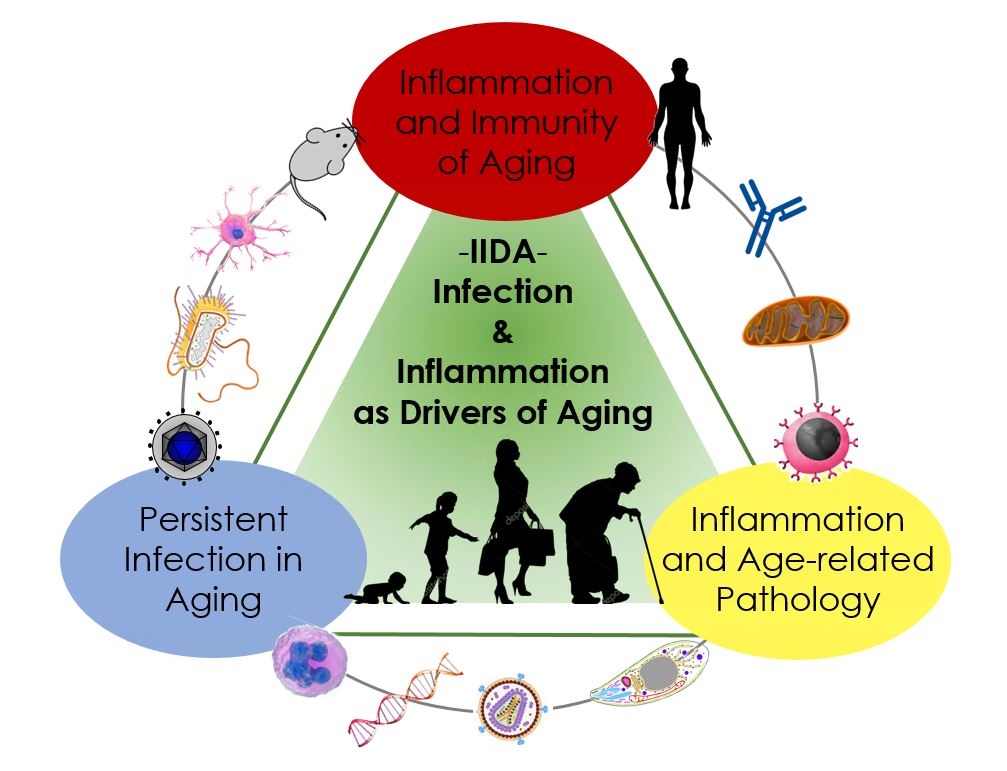
The most profound demographic change confronting our world is an explosion of people over 65 years of age. By 2050, this population will reach 80 million in the U.S. and 1.2 billion worldwide. Within that population, the number of people over 85 years of age will increase exponentially. Our incomplete knowledge of the biology of aging impedes our ability to respond to these challenges and compounds the problem of chronic diseases in aged individuals. Through the IIDA training program, we seek to train a new generation of scientists focused on defining the biology required to extend healthspan (the portion of life spent in good health) and enhance resilience (positive adaptation to challenges associated with aging). Drivers of aging are diverse and IIDA focuses on three overlapping research themes to assist students in their focus: (i) Inflammation and Immunity in Aging; (ii) Persistent Infection in Aging; (iii) Inflammation and Age-related Pathology.
Directors: Felicia Goodrum, PhD and Janko Nikolich, MD, PhD


Training Program in Infection and Inflammation as Drivers of Aging (IIDA)
Institutional training grants from the National Institutes of Health (NIH) support collaborative training and education in a variety of scientific areas. T32 Training Grant programs funded by the NIH enable graduate students and postdoctoral researchers to receive specialized training in specific areas from our world-class faculty.
Infection and Inflammation as Drivers of Aging (IIDA) is a T32 Ruth L. Kirschstein Institutional National Research Service Award. The purpose of this Kirschstein-NRSA training program is to enable institutions to recruit individuals selected by them for predoctoral and postdoctoral research training in specified shortage areas. The goal of this program is to prepare qualified predoctoral and/or postdoctoral trainees for careers that have a significant impact on understanding the biology of infection and inflammation as drivers of aging.
The goal of Infection and Inflammation as Drivers of Aging (IIDA) is to provide an innovative multidisciplinary program designed to train pre-doctoral investigators (4 per year) to define mechanisms underlying the roles of Infection and Inflammation as Drivers of Aging (IIDA). The IIDA training program is comprised of basic scientists, clinicians, and public health mentors at the University of Arizona (UA), a top 20 public Research I University, recognized for its training history in the field of basic biomedical research and for its commitment to mentoring, diversity (designated Hispanic-serving Institution) and cross-disciplinary training. In the last 3 years, as part of unprecedented growth in biomedical sciences, UA has identified research on aging as a pillar of all four strategic initiatives of the UA Health Sciences and as one of the top 10 initiatives of the UA College of Medicine.
The 21 NIH-funded faculty supporting this training program have diverse and strong expertise in infection, inflammation, immunology, and age-related pathologies. The training program is supported by a number of UA strengths in aging, basic sciences, clinical practice, and public health. The goal if the IIDA is to harness these strengths towards the premier training program in the underserved area of infection and inflammation as drivers of the aging process. The IIDA training program will provide unique opportunities for training the next generation of diverse scientists to advance our understanding of the biological basis of aging processes and develop strategies to enhance resilience and healthspan.
Eligibility
The Infection and Inflammation as Drivers of Aging (IIDA) is a T32 Ruth L. Kirschstein Institutional National Research Service Award from the National Institute of Health. Appointees must be U.S. citizens or permanent residents enrolled in a research or clinical doctoral or predoctoral program. Anyone on a temporary or student visa is not eligible.
Appointees must work in the laboratory of a IIDA Training Faculty and research must be in the broad fields of infection and immunology.
Predoctoral Trainee Expectations
PhD trainees are typically supported by the IIDA Program in years 2 and 3, MD/PhD trainees in years 3 and 4. Appointed trainees are expected to:
- Devote full-time effort during the trainee appointment period.
- Prepare and maintain an Individual Development Plan (IDP) that reflects interests and goals (aided by MyIDP: http://myidp.sciencecareers.org).
- Submit an annual self-evaluation and a short progress report
- Trainees and Mentors must participate (when possible) in all T32 events.
- Present research at a scientific meeting/symposiums including the annual IIDA Symposium.
- With Mentor, submit a manuscript and external funding application (NIH, AHA, etc.) during training period.
- Provide the IIDA administration annual updates regarding career moves and publications for a total of 15 years from date of initial appointment in order to fulfill Kirschstein-NRSA renewal requirements.
The length of the award will be for one year, with the option to reapply for a second year of support. The awardees will be chosen by the T32 executive committee.
IIDA 2023-2024 Trainees
Ivan Sarabia
IIDA Training Faculty
The image below summarizes all the training programs by faculty (listed above).

Past Awardees:
2022-2023:
2021-2022:
Kristen Zarrella
2020-2021:
2019-2020:

